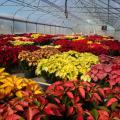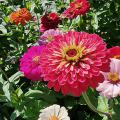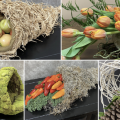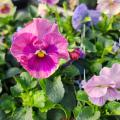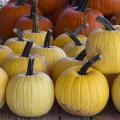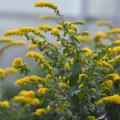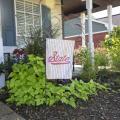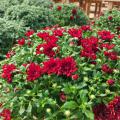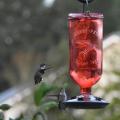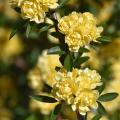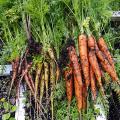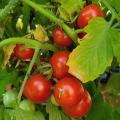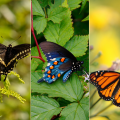News Filed Under Flower Gardens
Although it’s only mid-November, poinsettias will be arriving very soon at garden centers -- some may have already arrived -- for the holiday and Christmas season. In many people’s minds, the traditional poinsettia color is red. And let’s face it: A red poinsettia is beautiful. My favorite continues to be the traditional red. But red is not the only color available.
I’ve always enjoyed the fall season in the landscape and garden. I find the moderating temperatures refreshing, which helps me get my second wind when taking care of gardening chores. Many of our summer annuals seem to feel the same way about the reinvigorating fall weather. In fact, I think these summer annuals actually look their best in the fall. There is no better example of this than zinnias grown in the fall.
The cornucopia, or horn of plenty, is most often associated with Thanksgiving. It is generally depicted with the fruits of harvest overflowing its horn-shaped form and serves as a reminder to be thankful and grateful. If you like do-it-yourself projects, making your own cornucopia is an easy project.
Now is the time to plant one of the great, classic cool-season annuals. While they have a dainty look, violas are tough plants that will perform through the fall, winter and into the spring landscape and garden seasons. Violas go by either of the botanical names Viola tricolor or Viola cornuta, but most gardeners I know call them by their common name, Johnny jump ups.
My wife, Katie, and I continued our travels in Florida after I was a keynote speaker for the Florida Master Gardener Volunteer Conference. We enjoyed collecting seashells on Cocoa Beach while watching the latest SpaceX launch. As children of the 60s who grew up watching the exploits of NASA, this was really cool!
Recently in my role as a Mississippi State University Extension specialist, I had the opportunity to promote horticulture and bring back great tips from friends in Florida. On Saturday, I co-hosted Better Lawns and Gardens on WFLA-Orlando with my great friend Teresa Watkins.
October is a great month to plant new shrubs in your home landscape. We’re passed the harsh summer heat, and the cooler fall weather is perfect for newly planted shrubs to produce new root growth. In fact, fall-planted shrubs get to grow through the moderate spring season
This year is almost like clockwork; we hit Oct. 1, and we’re suddenly enjoying night temperatures in the 50s and 60s all across Mississippi. This is a welcome change from previous years when it seemed that summer would never go away. For once, planting our cool-season annuals seems to be right on schedule.
As we move further into the fall season, I wonder if there is a more fitting and fun fruit than a pumpkin? Pumpkins have become a major part of any autumnal or Halloween decoration. And who can resist a fresh pumpkin pie? I know I can’t!
One of the sights I look forward to each year is goldenrod in full bloom. Beginning in late August and peaking about the third week of September, goldenrods seem to be along the roadsides of every highway and in in every natural area and field. The masses of bright yellow are gorgeous, and it’s hard for me to consider the goldenrod as a weed.
If you are a sports fan -- or even if aren’t but don’t want to let that secret out -- one way to show off your allegiance is in the garden. There may not be a better way to combine interests than through a creative display that can include blooms, foliage and even garden art.
September and October have many home gardeners wondering what to do with their landscapes for the next couple of months. Summer annuals are nearly worn out, and the weather is still too warm for winter color to be established. I have found fall mums to be an ideal bridge crop.
Over the weekend, we had a most welcome visitor return to my home garden and landscape after an absence of several months. Our first hummingbird of the fall season arrived, and this was an indicator of lots of activity in the next few weeks. I get excited to see the first fall hummingbirds because it means they’re going to start gathering all along the Gulf Coast in preparation for their fall migration.
Even though we’re still in a very warm August, now is the time to start thinking about fall color. It can be a garden challenge trying to maintain a variety of color in the coming cool-season landscape. In my opinion, dianthus is one good choice to help keep your garden interesting, and it is an easy choice for that extra splash of cool-season color.
As the time nears for summer to turn to fall and temperatures drop, I get excited thinking about the changes this will bring to the landscape. Depending on where you garden in Mississippi, September, October and November can be filled with some of the brightest colors of the year.
After last week’s discussion of growing sunflowers in the fall season, I was inspired to consider what is involved in growing yellow flowers all year in most Mississippi gardens and landscapes. Obviously, different plants need to be selected for the different seasons, so I’ve put together a list of yellow flowers that you can enjoy through the year.
I think sunflowers fall into the category of sunny, summer royalty. One of the most striking sunflower sights I have ever seen was while driving through North and South Dakota on the way to Sturgis and Bike Week. There were miles and miles -- acres and acres -- of yellow sunflowers blooming for as far as the eye could see.
Simply walking out the front door each day, we’re reminded that it is a blistering hot summer season. But believe it or not, now is the time to start planning and getting ready for the fall vegetable garden. We’re only 36 days from the meteorological start of the fall gardening season.
As the host of Southern Gardening, I promote primarily ornamental landscape and garden plants through newspaper articles, TV segments and social media posts. So I find it interesting that most of the questions I receive revolve around the vegetable garden.
Butterflies are a fan-favorite insect among many people. Not only are they pleasing to watch, they also play a vital role in our environment. Butterflies are pollinators, meaning they move pollen from one flower to another, fertilizing plants so they can reproduce. They’re both beautiful AND beneficial!

